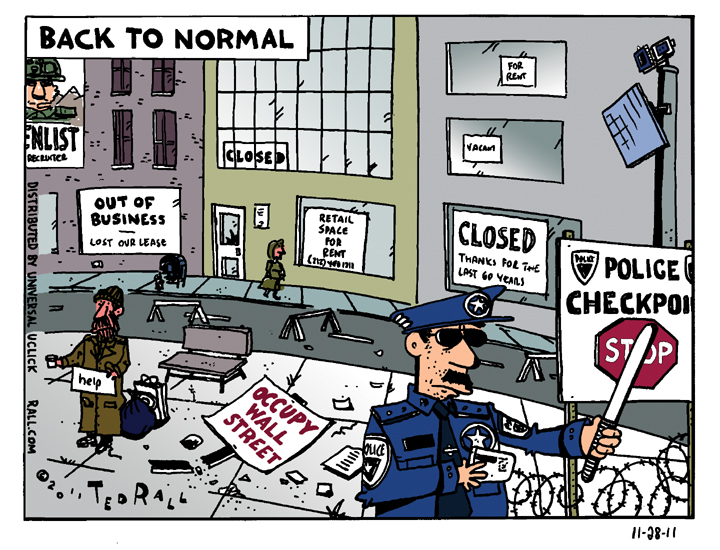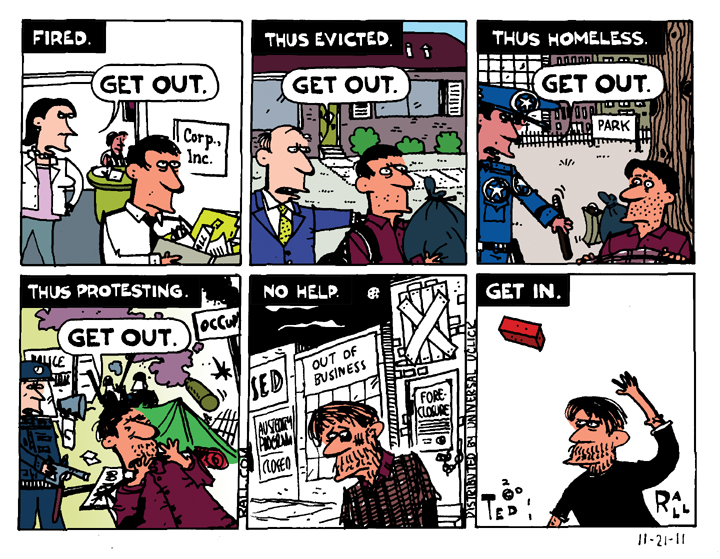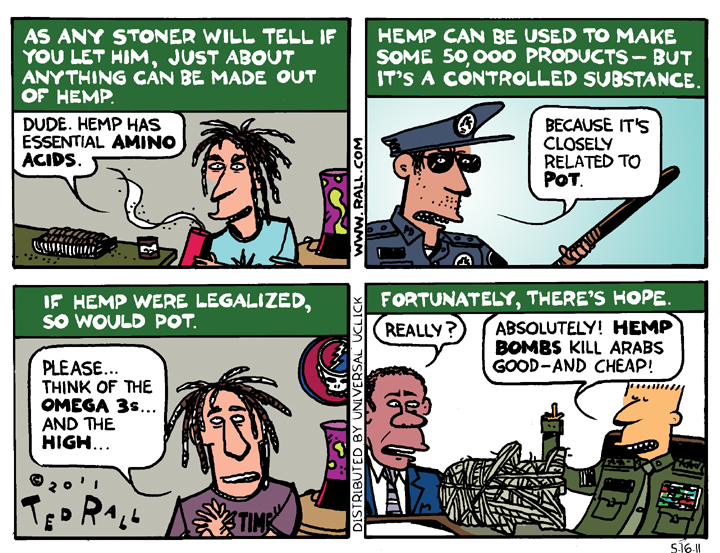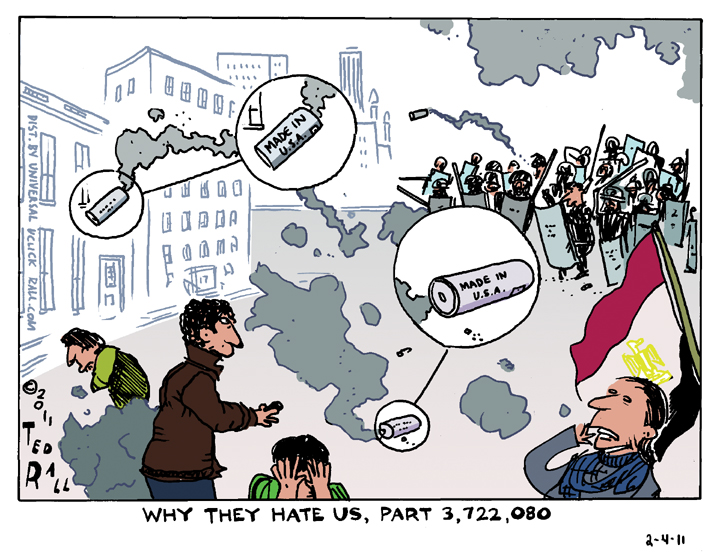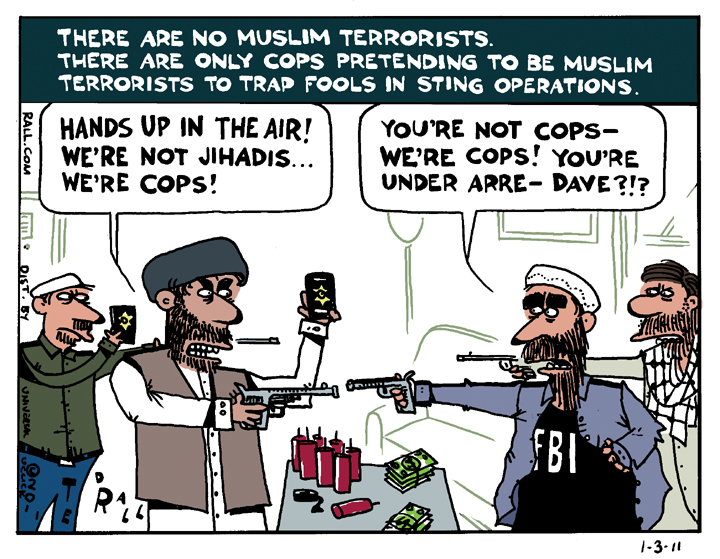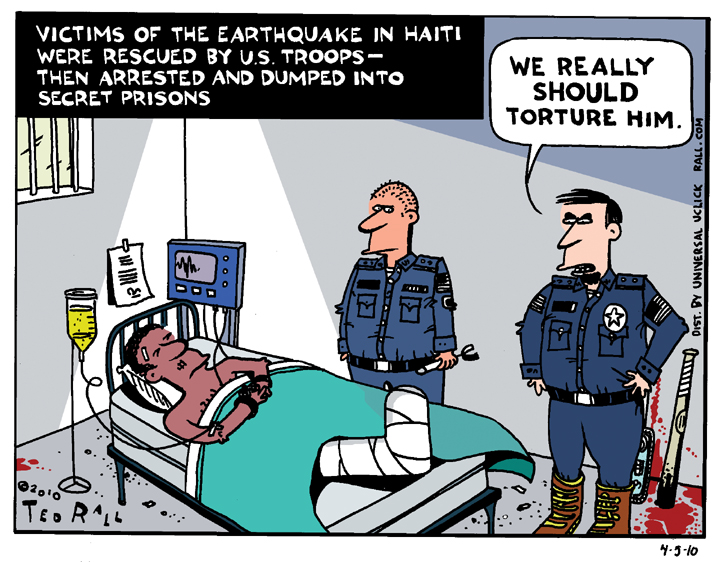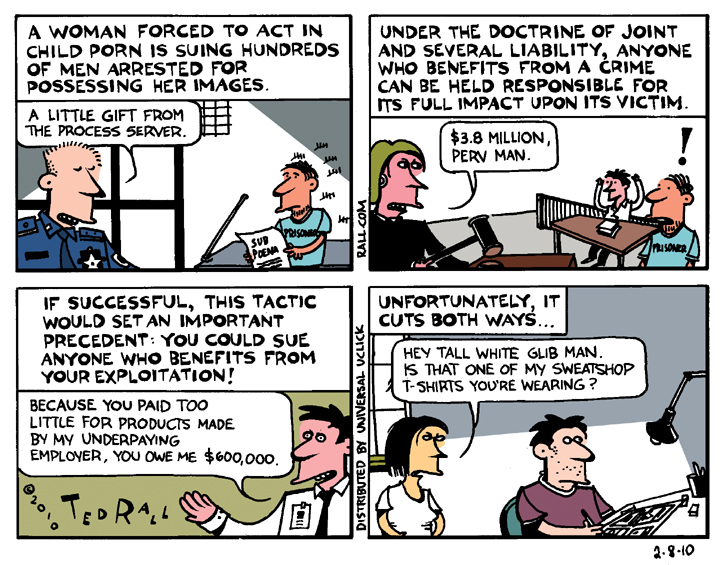Why does society tolerate and encourage booze consumption while obsessively banning marijuana?
SYNDICATED COLUMN: Cut-and-Paste Revolution, Part I
Winter Looms. Occupy Movement Wiggles Fingers. What Next?
“Let’s recreate Tahrir Square.” The email blast that began it all in June, a call for opponents of America’s wars and bank bailouts and rising income inequality and a host of other iniquities to occupy a public plaza two blocks from the White House, drew its inspiration from the Arab Spring.
The call worked. For the first time since the unrest of the 1960s, Americans joined spontaneous acts of protest and sustained civil disobedience in vast numbers. Why? Perhaps Americans, smugly dismissing the Muslim world as inherently inhospitable to democracy, were embarrassed to watch themselves shown up by people willing to face down bullets in Bahrain and Yemen and Libya. What’s a little pepper spray considering the thousands killed in Syria? Maybe Tahrir appealed because it worked. Or seemed to work. (Note to revolutionaries of the future: never trust the old regime’s military when they say it’s OK to leave them in power.)
The Arab Spring begat an American Fall. An aging Canadian magazine publisher cut-and-pasted the Freedom Plaza occupation (which still goes by the name of October 2011 Stop the Machine). Then he preempted STM, scheduling it to begin a few weeks earlier. He moved it to New York. Finally, he branded his cut-and-paste occupation with a better name: Occupy Wall Street.
Occupy Wall Street, not-so-new but much improved by its proximity to the national media based in Manhattan, began with aimless milling about the closed streets of the Manhattan’s financial district. It was ignored. A week later the collision of a thuggish NYPD officer, a dollop of pepper spray and four stylish young women made the news. “The cops spraying a bunch of white girls, well, our donations have tripled,” victim Chelsea Elliott told The Village Voice. Within a month, OWS was the beneficiary of an unreserved endorsement by The New York Times editorial board. On Sunday, no less–the most widely read edition.
More than a thousand cities now have their own occupations, cut-and-pasted from their format of their Washington and New York granddaddies. The Occupations trend white and young. They claim to be leaderless. Most of them cut-and-paste their tactics from OWS. They first take over public parks in downtown areas. Then they either apply for police permits to use a public park (as in Washington), obtain approval from private owners (as in New York), or take over spaces sufficiently unobtrusive so that the authorities grant their tacit consent (as in Los Angeles, where the encampment is in the city’s mostly disused downtown).
With a few exceptions like Denver, where police forcibly cleared out and arrested Occupy Denver members and confiscated their tents and other property, most local and federal law enforcement agencies have assumed a “soft pillow” approach to the Occupy phenomenon.
This missive to Occupy L.A. participants gives a sense of the modus vivendi: “The event organizers say they have talked to the police and the police say they are welcome. There are certain rules planned to be in place, such as moving tents off the grass onto the sidewalk at night. Please follow the directions of the police or any officials. The lawn has an automatic sprinkler system that someone who went and watched says turns on at 8 pm – 9 pm. The park area closes at 10 pm, but sleeping on the public sidewalks adjacent to the street is allowed from 9 pm to 6 am. That is the sidewalk surrounding the park area, not the sidewalk within the park area. Also, keep in mind you can be charged for clean-up and repairs, so wherever you go, be sure you do not create any need for clean-up or repairs. Please be very mindful of this.”
Aware of the fact that the movement has grown in response to official pushback–in New York after the pepper-spraying of the four women as well as after a threatened “clean up” operation similar to what went down in Denver–police are reluctant to create a spectacle of violent official repression. Protesters, meanwhile, are understandably reluctant to become victims of violent official repression. There have been hundreds of arrests, but no violent showdowns as we’ve seen in Athens. Leftist professor Cornel West seems to get booked every other day yet looks none the worse for wear.
In the absence of serious confrontation the occupations have become campsites. After police threatened to sweep up Freedom Plaza in Washington hundreds of supporters poured in to face down the police. The U.S. Parks Police blinked; now Stop the Machine has an official four-month permit. The same thing happened when New York Mayor Michael Bloomberg scheduled a police-led “clean up” of Zuccotti Park. A night’s worth of phone calls by panicky city politicians made him back down.
Also, as The Nation reports, the NYPD wasn’t certain they had legal grounds for evicting the Occupiers from Zuccotti Park, which is public but privately-owned: “Jerold Kayden, a professor of urban planning and design at Harvard’s Kennedy School, says that these spaces ‘occupy a somewhat murky terrain in terms of what activities and conduct of public users within the space should be acceptable and what goes beyond the pale.’ That is, the protesters have been able to set up camp in Zuccotti not because of any regulation that protects their presence there, but precisely because of a real lack of any defined regulations at all.”
With free food, legal services, a press table and bilingual information booths–plus the passage of time–Occupy Wall Street looks increasingly permanent.
Occupy movement outposts utilize an anarchist-inspired “general assembly” structure to make decisions ranging from the profound (resolved, that we should jail Obama) to the mundane (what time shall we hold the next general assembly). Everyone gets to speak. A “mic check” of repeated lines pass everything said to the outer ring of listeners. Attendees indicate approval by holding their fingers up and wiggling them. Downward wiggling indicates disapproval; sideways wiggling reflects uncertainty. Forming a triangle with one’s fingers is a demand for a point of process.
Why this approach? No one asks. That’s how it goes with cut-and-paste.
Crossed arms are a “block.” Anyone may block any motion. A 999-to-1 vote means no passage. Blocks, we are told by non-leader facilitators, are a nuclear option. “You might block something once or twice in your lifetime,” Starhawk, a genre novelist introduced as an experienced facilitator at one of the D.C. occupations. But a lot of nukes went flying around. Occupy Miami took weeks to get off the ground because rival factions (liberals vs. radicals) blocked one another at every turn.
Cut-and-paste at every turn: the local occupations use similar interfaces, even typefaces, for their websites and Facebook pages.
The movement has grown nicely. But, just as Mao found it necessary to adapt industrial-proletarian-based Marxism to China’s agrarian economy with “Marxism with Chinese characteristics,” activists are about to face the negative consequences of trying to replicate Tahrir Square in the United States. The U.S. isn’t Egypt. It isn’t even European. Americans need Tahrir Square with American characteristics.
Conditions on the ground necessitate a reset.
Namely: the weather.
IN MY NEXT COLUMN: Winter is coming. What will happen to the northern Occupations when the snow starts falling?
(Ted Rall is the author of “The Anti-American Manifesto.” His website is tedrall.com.)
COPYRIGHT 2011 TED RALL
SYNDICATED COLUMN: Guilty After Proven Innocent
Make DSK Whole—Then Jail Him
“Innocent until proven guilty.” We say it. We teach it to our children. But we don’t believe it.
Dominique Strauss-Kahn, charged with ambushing a hotel cleaning person at a hotel in midtown Manhattan and forcing her to perform oral sex on him, has been released.
This was not the usual case of a well-heeled defendant wielding money and influence to weasel out of responsibility for his crime. To the contrary, the NYPD and district attorney believed the alleged victim, initially characterized as a hard-working immigrant struggling to support her family. The cops aggressively pursued DSK, as the French media calls him. They even subjected him to the “perp walk” that signifies official contempt.
But that’s all over. District attorney Cyrus Vance, Jr. says the case has fallen apart. The victim was unreliable at best, a conwoman at worst. The charges are dead. DSK is free.
Innocent until proven guilty, right?
Technically.
But not really.
When you’re accused, the story screams in blood-red 112-point type above the fold on page one for weeks on end. When you’re exonerated, it runs one column-inch buried in the classifieds—on the day all your friends, relatives and colleagues happen to miss the paper.
Strauss-Kahn won’t go to prison. Not for whatever happened or didn’t happen at the Sofitel. (He will face a rape charge filed by a French reporter, who accuses him of going after her “like a chimpanzee in rut” years ago.)
Though legally innocent, DSK will not be restored to his job leading the International Monetary Fund, which he was forced to resign as he cooled his heels at Rikers Island. No reason given. Just: no.
Before getting dragged out of his first-class seat on an Air France jet bound for Paris, the deaccused rapist was widely considered a frontrunner for the Socialist Party’s nomination for the French presidency. Now George W. Bush has a better chance than DSK of moving into Elysée Palace. Too much dirt has come out. Legally innocent he may be, but too many voters harbor doubts.
Like the old Soviet Union, the United States and its Western puppet states (France included) mindlessly repeat too many sweet-sounding slogans devoid of real meaning: “Equal justice under the law.” “All men are created equal.” “One man, one vote.”
“Innocent until proven guilty.”
If legal innocence (i.e. the failure of the state to convict one of a crime) is to rise above the status of hollow rhetoric, people like DSK ought to be entitled to the full restoration of their pre-arrest status. In DSK’s case, he is morally entitled to his old job at the IMF and an open invitation by the French Socialists to run for his nation’s highest office. He also deserves to be compensated for the legal bills and bail costs he accrued during his ordeal.
Not many people reading this will agree with me. Which is my point: as a society, we don’t really believe in “innocent until proven guilty.”
We did not revel in Dominique Strauss-Kahn’s arrest because of the crime that the legal system has since decided not to pursue, rape. We laughed and jeered because we hate(d) him.
We hate(d) DSK because he is rich and evil.
Had DSK been a run-of-the-mill accused rapist, few would have noticed and no one would have been as gleeful about his predicament. Here was the fearsome chief of the mighty IMF, an old, smug, white pig forced to shower with an electronic monitoring device locked to his ankle. “Le Perv!” shouted the New York Post.
How delicious!
After the arrest I published a cartoon showing DSK in a police interrogation room. I pride myself on my refusal to leap aboard media bandwagons, so I didn’t assume he was guilty. “What’s the big deal?” I showed him asking police detectives. “I’ve been raping the world for years!”
It takes a cruel genius to turn big profits on the backs of the world’s poorest people. Meet DSK’s IMF.
First IMF officials such as DSK convince the political leaders of say, Kyrgyzstan, that they could rapidly modernize their Fourth World backwater with a loan. Build some new highways! How about that long-awaited hydroelectric dam? Foreign corporations will rush in to do business! Paying us back will be a breeze!
This is, to be charitable, as overly optimistic as Countrywide telling slum dwellers they’ll never regret an adjustable-rate mortgage. There are good reasons that foreign firms do not invest in dumps like Kyrgyzstan. Those reasons do not change because there’s a new airport road or a new four-star hotel.
Increase in GDP or no, the IMF loans come due. What to do? IMF experts parachute in. Their recommendation: “structural adjustment.” No more profligate spending on social programs. Close those pricy health clinics! The IMF is the world’s biggest loan shark.
Ripped social safety nets cause social unrest. Kyrgyzstan, once relatively stable, was propped up by IMF loans in the late 1990s. They came due, forcing the poor nation to curtail social spending. It has since been swept by a series of riots, coups, ethnic cleansing and even warlordism.
Here in the United States, IMF-style gangster capitalism takes the form of Republican/Tea Party “starve the beast” demagoguery. There’s always money for rich people. And for wars. And for wars that make rich people richer. For the poor and middle-class, Medicare and Social Security are ostentatious and unaffordable luxuries. Socialized medicine, guaranteed cost-of-living increases and unlimited unemployment benefits are off the table.
It is this economic outlook, devoid of humanity and contemptuous of people’s basic needs, that Dominique Strauss-Kahn represents.
We all hate him. We hate those like him. That perp walk looked so…right.
He deserves prison, no doubt about it. Until there’s a revolution, however, DSK will never suffer for the crimes he committed as a globe-trotting financier.
Even as DSK flew first-class and left his most intimate DNA in $450-a-night suites at four-star hotels, his IMF was demanding that the citizens of Greece and Portugal slash pensions and hike college tuition. That is his biggest crime, undeniable and unforgivable, and the one for which he and those like him should someday face justice.
(Ted Rall is the author of “The Anti-American Manifesto.” His website is tedrall.com.)
COPYRIGHT 2011 TED RALL


